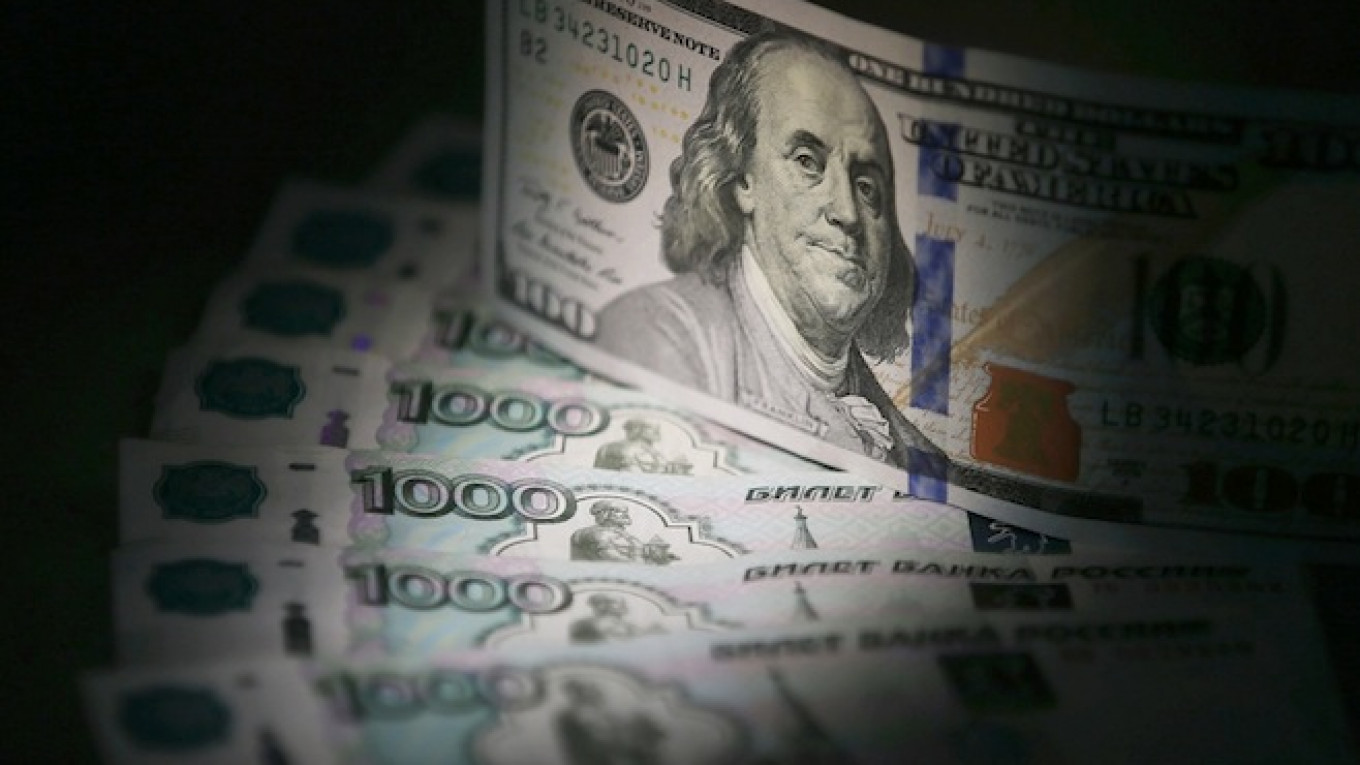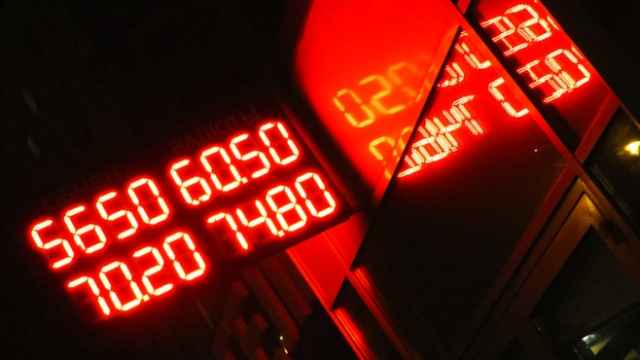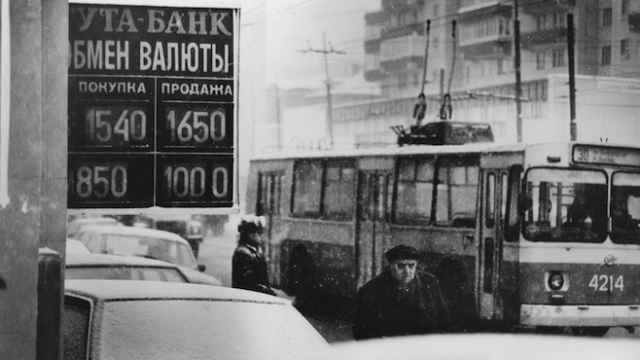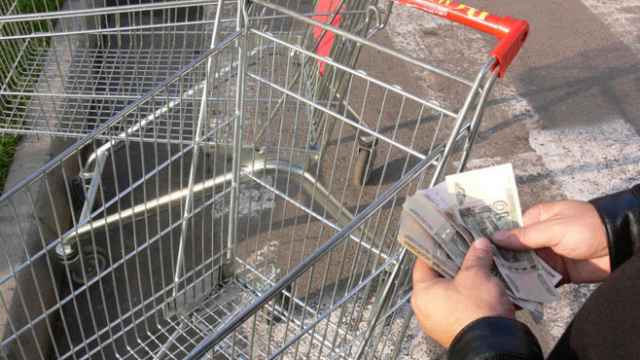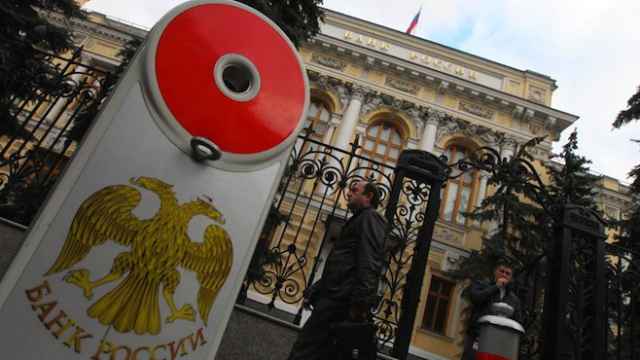The Russian currency crashed past 100 against the euro Tuesday, the latest milestone in a currency rout that has rapidly gained momentum despite a huge emergency rate hike from the Central Bank.
One ruble became worth less than one euro cent at 3:13 p.m., according to data from the Moscow Exchange. At the same time, the Russian currency plummeted to 80.1 against the U.S. dollar.
The crash took the ruble's fall Tuesday to 20 percent, the largest one-day currency movement since the financial crisis of 1998 and compounding a 10 percent tumble the previous day.
The ruble later reduced its losses, and at 9 p.m. had stabilized around 8 percent weaker against the greenback at 70 and 11 percent down versus the euro at 89.
The Russian currency has now fallen 55 percent against the dollar since the beginning of the year, making it the worst performing currency in the world in 2014.
"The Central Bank's credibility is in tatters,” said Timothy Ash, an emerging-markets analyst at Standard Bank, in a note to investors Tuesday.
Earlier Tuesday, the ruble jumped sharply, strengthening as much as 10 percent to 58.1 rubles against the dollar, following an overnight announcement from the Central Bank that it was increasing interest rates to 17 percent from 10.5 percent.
But the gains were short-lived, as oil price weakness and sentiment once again intensified pressure on Russia's tumbling currency.
Brent crude dropped below $60 a barrel, reaching $59.02, a level not seen since 2009 on Tuesday.
Prime Minister Dmitry Medvedev convened a meeting to discuss the financial situation Tuesday, according to a government press release.
The gathering was attended by Deputy Prime Minister Igor Shuvalov, Kremlin economic aide Andrei Belousov, Finance Minister Anton Siluanov, Economic Development Minister Alexei Ulyukayev and Central Bank chairwoman Elvira Nabiullina, the press release said.
Ulyukayev said after the meeting a set of measures to stabilize the situation had been discussed, including measures to boost access to hard-currency liquidity from the Central Bank and legislative initiatives to support banks and empower the regulator, according to news agency RBC.
With its largest interest rate hike since the 1990s, the Central Bank bet Tuesday that a higher return on deposits and savings would make the ruble more attractive, easing the pressure exerted by a declining oil price and Western sanctions on Moscow imposed as a result of the Ukraine crisis.
Central Bank chairwoman Elvira Nabiullina said Tuesday that Russians that they should get used to living in a “new zone,” according to an interview on state-owned television channel Rossia-24.
The Central Bank, which has already spent over $70 billion of its foreign currency reserves this year defending the ruble, will likely be forced into market interventions, analysts at Sberbank CIB said in a note to investors Tuesday.
“Meaningful currency interventions must follow the huge Central Bank rate hike,” the analysts said.
Despite speculation of intense political pressure on the Central Bank to try to tame the ruble without frittering away Russia's currency reserves, President Vladimir Putin has not commented on the currency's dramatic recent decline.
The market turbulence was caused by “emotions and a speculative mood,” Putin's spokesman Dmitry Peskov said Tuesday, according to Russian news agency RIA Novosti.
The ruble's tumble in recent days has sparked heavy criticism of Russia's authorities from investors and lawmakers.
"The fall of the ruble and the equity market is not only a reaction to the low price of oil and sanctions but to a distrust of the government's economic measures," former Finance Minister Alexei Kudrin wrote on Twitter in the early hours of Tuesday morning.
Others said that the Central Bank and her chairwoman Elvira Nabiullina had disastrously miscalculated the situation.
"Lack of action had left the stability of the very financial system at stake. I am not sure whether Nabiullina can survive this," analyst Ash said.
“It has only to be a matter of time before the rating agencies respond with ratings downgrades, likely to junk status.”
Contact the author at [email protected]
A Message from The Moscow Times:
Dear readers,
We are facing unprecedented challenges. Russia's Prosecutor General's Office has designated The Moscow Times as an "undesirable" organization, criminalizing our work and putting our staff at risk of prosecution. This follows our earlier unjust labeling as a "foreign agent."
These actions are direct attempts to silence independent journalism in Russia. The authorities claim our work "discredits the decisions of the Russian leadership." We see things differently: we strive to provide accurate, unbiased reporting on Russia.
We, the journalists of The Moscow Times, refuse to be silenced. But to continue our work, we need your help.
Your support, no matter how small, makes a world of difference. If you can, please support us monthly starting from just $2. It's quick to set up, and every contribution makes a significant impact.
By supporting The Moscow Times, you're defending open, independent journalism in the face of repression. Thank you for standing with us.
Remind me later.



